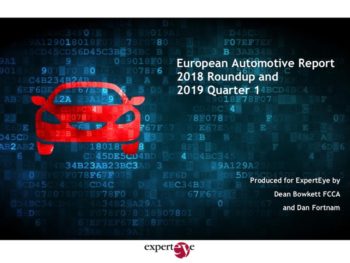WLTP to destabilise LCV market, warns Experteye report
After seven straight months of impacting new car sales, WLTP is set to start taking its toll on the LCV market from September.

The latest Experteye report sets out that the impact of WLTP on new car sales was far worse than most predicted – with LCVs to be hit next
That’s one of the findings from the latest Experteye European Automotive Report, which provides an overview of the general economic climate in Europe as well as new car sales and the used market/RVs for the end of 2018 and Q1 2019, plus an outlook on the coming months.
Produced by leading industry expert Dean Bowkett, with collaboration from Dan Fortnam, Experteye’s business development director, the report sets out that after a strong 2017 and early 2018 the European economy did start to weaken as previously anticipated. The trade war between China and the USA helped to fuel a slowdown in global trade, whilst the introduction of the Worldwide harmonised Light vehicle Test Procedure (‘WLTP’) in Europe in September 2018 caused disruption to car sales and production as some manufacturers were late in getting their vehicles homologated, preventing them from selling them. Other headlines include the European Central Bank having been forced to cut growth forecasts as German manufacturing hit a six-year record slump, while Brexit continues to be an unwelcome distraction for many.
For new vehicle sales, the report sets out that there have been seven straight months of decline since WLTP started in September; far worse than predicted. Looking ahead, Experteye expects the rate of decline to slow down a little, but says this will take time and therefore new car sales are expected to be down 3.7% in 2019 and 2.1% in 2020.
Meanwhile although LCV sales have seen positive growth over recent months, the introduction of WLTP in September is expected to wipe out most of that. Experteye is predicting total sales in 2019 will be down 3.5% with a further 1.2% drop in 2020.
The report also looks at the continued sharp decline of diesel; new diesel cars were down by 18.4% across Europe for the whole of 2018 versus 2017, according to data from the ACEA.
In volume terms diesel sales fell by 1.24 million in 2018 over the previous year with 78% of former diesel car buyers switching to petrol vehicles instead.
Hybrid cars, including plug-in hybrids, were the other winners against falling diesel sales as sales grew by 180,000 which was a 29.6% increase over 2017 sales. Hybrids now account for 5.1% of the passenger car market in Europe and within the next five years hybrids look set to be at least 25%-30% of all new sales with battery electric vehicles taking a circa 7%-10% market share.
The report also looks at residual values and finds that for diesels, demand continues to be strong in most markets with used diesel prices holding up well. But residual value setters are being cautious and RV trends in most countries are likely to remain marginally downwards over the next year or so with the petrol/diesel RV divergence continuing. In contrast, hybrid RVs are likely to start rising as the new vehicle price relative to traditional fuel types closes.
Despite very strong demand and high premiums on Euro-6 diesel LCVs, residual values have yet to show the same degree of strength – but according to Experteye, this should change for 2019.
To receive a copy of the Experteye European Automotive Report, please email author Dean Bowkett.







